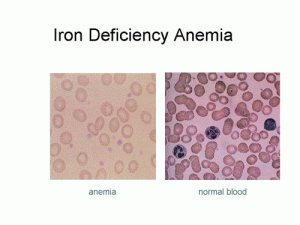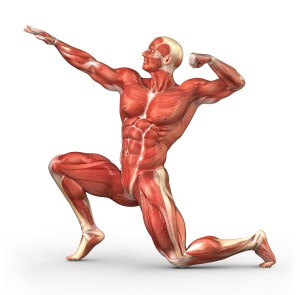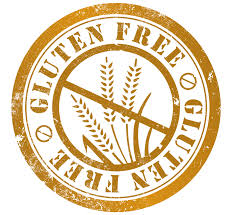It has been suggested that gluten can contribute to iron deficiency. But is that really true? And if it is, what can we do about it?
Iron deficiency is one of the first signs of celiac disease, and it has been suggested that removing gluten from the diet of people with celiac disease can help to prevent iron deficiency.
Further to this, iron deficiency is also a problem in athletes, and in particular in female endurance athletes. As a result it has been suggested that a gluten free diet may also help with recovery from iron deficiency in athletes. In addition to this, a growing list of athletes claim that going gluten-free has enhanced their performance possibly due to enhanced iron absorption.
Why is iron important to athletes?
Red blood cells, which contain haemoglobin- an iron containing protein, transport oxygen to your working muscles during exercise. If you have low iron levels, you will generate fewer red blood cells and your haemoglobin levels will decline. Therefore, less oxygen will be transported to your muscles, and performance will suffer. As a result of this, having a low iron level is one of the most common reasons why athletes perform poorly in training and races.
How is iron lost by athletes?
- Amazingly, iron can be lost through the feet
- Foot strike haemolysis can occur in any athlete, but is most common in runners, especially those who run high mileage. Foot strike haemolysis is a process where red blood cells are damaged when the foot hits the ground, thus reducing your haemoglobin levels.
- Iron can be lost through sweat
- The amount of iron lost through sweat is minimal, athletes training in hot and humid conditions can lose a large amount of iron as the loss through sweat add up.
- Iron can be lost through the intestines
- Loss of iron through the GI tract (primarily the stomach or large intestine) is a problem for some athletes. Iron loss through the GI tract is fairly minor, but there may be a cumulative effect over months of running that leads to iron deficiency.
- Iron loss can be high in female runners
- It can be hard to maintain proper iron levels during training as in addition to the other routes of iron loss they can also lose iron during menstruation.
Why do athletes go gluten free?
If an athlete has celiac disease or a wheat allergy, going on a gluten-free or wheat-free diet is of course going to be beneficial as it means no distressing symptoms can hinder performance. But, for athletes without gluten sensitivity, going gluten free can, it has been said, alleviate gastrointestinal symptoms, improve mental acuity and focus, increase their energy, and improve athletic performance. While there is no research to support or refute a performance-enhancing effect of a gluten free diet, there are many anecdotal reports of improved overall well being and athletic gains cannot be discounted.
Benefits of a gluten free diet to performance
So, how might a gluten free diet improve performance?
Firstly, a gluten-free diet may spur an overall healthier eating plan. Most processed, packaged foods, and fast food items contain gluten and there are many additives used as thickeners, sweeteners, or fillers which contain gluten. Therefore, when gluten is eliminated, many ‘unhealthy’ foods have to remove from the diet and the athlete has to find alternatives. If fresh, less-processed natural foods are chosen more often, the quality of the athlete’s diet improves automatically and so will performance, at least initially.
Secondly, grains that do not contain gluten such as quinoa, amaranth, teff, and millet (collectively, the “ancient grains”) are rich in vitamins, minerals, fibre, and protein. When an athlete contains products such as bread and pasta, made from these grains their nutritional intake is improved compared to eating refined grains. When these foods are are combined with others that are naturally gluten-free, such as fruits, vegetables, lean proteins, nuts, and seeds, the diet is extremely rich in nutrients and so performance can improve.
Finally, going gluten free can help an athlete’s entire diet to improve as it receives greater attention. When an athlete follows a gluten-free diet, they have a greater overall interest in nutrition and are more aware of how their body responds to different foods and eating patterns. In the process of learning about a gluten-free diet, they spend more time planning and preparing healthy meals, reading nutrition labels for sources of added sugar and salt, and eating more fruits and vegetables. In general, this often leads to the development of fueling strategies that support better training, performance, and recovery.
Problems of a gluten free diet
Problems can arise if gluten-free dietary changes are not carried out carefully and thoughtfully.
- Carbohydrate intake must continue to be adequate.
- Most athletes require six to 10 grams of carbohydrates per kilogram of body weight on a daily basis.
- Endurance athletes may need more during certain phases of training and competition.
- A lack of carbohydrate can lead to glycogen depletion, fatigue, and poor performance.
- Although many gluten free products are healthy and unprocessed, there are many highly processed, gluten free foods.
- Additionally if the athlete eats sweets and chocolate to replace the energy they would gain from gluten containing foods then it is unlikely that their performance will improve.
Also, remember that a gluten-free diet is not just healthier. For a person with celiac disease, it is healthier, but for others, this is questionable and likely depends on baseline eating habits, as well as the quality of food choices made on a gluten-free diet. Therefore, If you don’t want to go gluten free, but don’t want to risk iron deficiency it is often helpful to follow some simple guidelines to aid the absorption of iron either from supplements or through the diet.
How can iron supplements be better absorbed?
- Ferrous sulphate should be the form of iron supplement chosen. This form of iron can be taken in a pill or liquid form. Pills are often easier to find, but liquid absorbs better.
- Avoid calcium an hour before and an hour after taking an iron supplement. Iron should also be taken with vitamin C and a B-complex supplement to aid absorption.
- Taking an iron supplement before bed is usually best as iron supplements can sometimes cause minor stomach issues and gas. If you take them at night, this is less likely to happen, however, if your stomach does bother you, then choosing ferrous gluconate rather than ferrous sulfate can be easier on the stomach.






